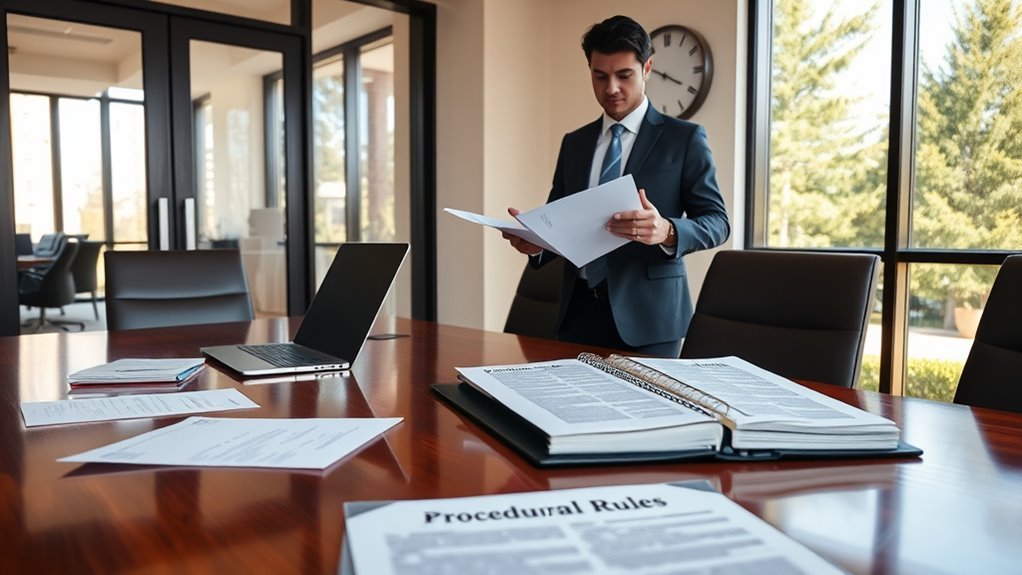How to Prepare for a Hearing Before the Regional Director (RD)
To prepare for a hearing before the Regional Director (RD) in the context of Indian laws and regulations, begin by familiarizing yourself with the RD’s role and the applicable procedural rules. It’s crucial to research relevant laws, particularly significant statutes such as the Industrial Disputes Act, and to collect all necessary documents and evidence that will support your case.
Organize your testimony around key points and formulate a clear argument strategy, while also anticipating potential counterarguments that may arise during the hearing. Engaging expert witnesses who can provide relevant insights or opinions can enhance your case significantly. Additionally, practice your presentation skills to ensure that you remain calm and confident throughout the hearing.
For further information on effective strategies that can bolster your approach, consider exploring resources that delve into legal preparation and advocacy in the Indian context.
Key Takeaways
- Familiarize yourself with relevant Indian statutes and case law, ensuring a clear understanding of the legal frameworks applicable to your case, such as the Indian Contract Act, the Arbitration and Conciliation Act, or any specific regulations based on the matter at hand.
- Organize and prepare all necessary documentation and evidence, including witness statements and official records, ensuring they are easily accessible during the hearing. This may include any relevant registrations, agreements, or affidavits that substantiate your claims.
- Develop a structured argument strategy, focusing on key points and utilizing strong evidence to support your case presentation, drawing from precedents set by Indian courts to strengthen your argument.
- Anticipate potential counterarguments and prepare detailed rebuttals based on Indian legal provisions and previous case judgments relevant to your hearing.
- Practice your presentation skills and engage in mock debates to build confidence and ensure clarity in delivering your arguments, while adhering to the etiquette and formalities expected in Indian legal proceedings.
Understanding the Role of the Regional Director

The Regional Director (RD) plays a critical role in the hearing process under Indian laws and regulations. They’re tasked with interpreting relevant statutes and ensuring that the legal framework is applied fairly to all parties involved.
As you prepare for a hearing, it’s important to remember that the RD will thoroughly assess the facts of your case and evaluate the evidence presented. Understanding the RD’s perspective can help you formulate an effective strategy for your arguments.
It is essential to articulate your points clearly and concisely, as the RD appreciates directness and straightforwardness in presentations. The RD has the authority to issue decisions that can significantly affect the outcome of your case, which emphasizes the importance of presenting your most compelling arguments.
Engaging with the RD in a respectful manner is crucial, as it fosters a constructive atmosphere throughout the hearing process.
Keep in mind that your preparation will significantly influence how the RD perceives and evaluates your case. Ensuring you’re well-prepared can make a substantial difference in the proceedings.
Researching Relevant Laws and Regulations
Before heading into a hearing, it’s crucial to familiarize yourself with the key statutes relevant to your case under Indian law.
Understanding the applicable case law can provide valuable insight into how similar situations have been adjudicated in the past, guiding your approach.
Additionally, reviewing compliance guidelines established by relevant regulatory bodies will help ensure that you adhere to necessary protocols throughout the legal process. Regular compliance reviews are essential for maintaining business integrity and can assist in preparing for the hearing by outlining best practices to follow.
Key Statutes Overview
When you’re preparing for a hearing in India, understanding the key statutes that apply to your case is crucial. Familiarizing yourself with these laws can greatly impact the outcome of your case.
Here are three essential statutes to focus on:
- The Industrial Disputes Act, 1947: This law governs labor relations in India and outlines employees’ rights, forming the foundation for many labor-related disputes. It provides a framework for the resolution of industrial disputes and ensures fair treatment of workers.
- The Administrative Tribunals Act, 1985: This statute governs the establishment of administrative tribunals for the adjudication of disputes and complaints concerning the service matters of public servants. It ensures a fair and efficient process for resolving administrative issues.
- The Rights of Persons with Disabilities Act, 2016: This law outlines the rights and entitlements of persons with disabilities in India, promoting their full and effective participation in society. Understanding these rights can be critical when discussing issues related to discrimination and accessibility.
Make sure to review these statutes thoroughly, as they form the backbone of your legal strategy in Indian legal contexts.
Case Law Analysis
Understanding case law is essential for building a solid foundation for your hearing preparation under Indian laws and regulations. By researching relevant legal precedents, you’ll gain insights into how similar cases have been handled in the Indian judiciary, which can significantly influence the outcome of your case. Start by identifying key cases that relate to your specific situation within the Indian legal framework, and pay attention to the rulings and their implications.
Here’s a quick overview of important aspects to consider:
| Aspect | Details |
|---|---|
| Relevant Cases | Cases that align with your legal issues in India |
| Judicial Interpretations | Interpretations of laws by Indian courts |
| Precedent Impact | How case outcomes affect future rulings in India |
Familiarizing yourself with these elements will empower you to strengthen your arguments and effectively anticipate counterarguments during your legal proceedings.
Compliance Guidelines Review
As you prepare for your hearing, reviewing compliance guidelines is essential for managing the complexities of relevant Indian laws and regulations. By understanding these standards, you can effectively navigate the legal landscape and strengthen your position.
Here are three key areas to focus on:
- Indian Statutes: Familiarize yourself with applicable Indian laws, which lay the groundwork for compliance. This includes understanding acts such as the Indian Contract Act, the Companies Act, and other relevant legislation.
- State Regulations: Investigate any specific state laws that may impact your case, as these can vary significantly across different states in India. Each state may have its own set of regulations that could be pertinent to your situation.
- Industry Standards: Review relevant industry guidelines or best practices within the Indian context to demonstrate adherence and establish credibility. This could include guidelines from regulatory bodies like the Reserve Bank of India, Securities and Exchange Board of India (SEBI), or other sector-specific organizations. Additionally, be aware of the registration process that entrepreneurs must follow to ensure compliance in starting a business in India.
Gathering Necessary Documentation
Gathering the right documentation is essential for your hearing under Indian laws and regulations.
You’ll need to collect relevant case files and any supporting evidence that strengthens your position.
This preparation can significantly influence the outcome, so it’s crucial not to overlook this important step.
Ensure that all documents adhere to Indian legal standards and are properly organized to facilitate a smooth hearing process.
Relevant Case Files
When preparing for a hearing in the context of Indian laws and regulations, having the right case files on hand is essential, as they provide crucial evidence to support your arguments. Begin by gathering all relevant documents to ensure you’re well-prepared. Here are three important items to consider:
- Previous Correspondence: Collect all emails, letters, or memos that demonstrate your communications related to the case. This could include any formal notices or responses required under Indian legal practices.
- Official Records: Ensure you have all necessary legal documents, such as FIRs, charge sheets, or court orders that pertain directly to your matter. These records will be vital in establishing the facts of the case as per Indian law.
- Witness Statements: If relevant, gather statements from witnesses who can testify or provide evidence to support your position during the hearing. This could include affidavits, which are often pivotal in Indian judicial proceedings.
Having these files organized and accessible can significantly enhance your ability to present your case effectively and with confidence in the Indian legal system.
Supporting Evidence Collection
To build a robust case for your hearing under Indian laws and regulations, it’s essential to gather supporting evidence that substantiates your claims and arguments.
Begin by organizing all relevant documentation, such as emails, correspondence, and other materials pertinent to your case. Ensure you collect statements from witnesses, as these can provide credible support for your position.
If relevant, compile expert opinions or reports that bolster your claims. It’s crucial to accurately document dates and events, as this information can be vital in the eyes of the law. Additionally, consider the importance of understanding the underlying issues that led to your hearing, as this can guide your evidence collection.
While collecting evidence, keep everything well-organized and easily accessible, as you’ll need to present it clearly during the hearing.
Preparing Your Testimony and Evidence

As you prepare for your hearing under Indian laws and regulations, it’s essential to concentrate on formulating your testimony and compiling evidence that bolsters your case. Your testimony should be articulated clearly and honestly, concentrating on the critical elements you wish to communicate.
Preparing your testimony and gathering supportive evidence are vital for a successful hearing under Indian laws.
It’s important to remember that the impact of your presentation lies not only in the content but also in your delivery.
Here are three key steps to guide you:
- Outline Your Main Points: Identify the pivotal aspects of your case and organize your testimony in a structured manner around these points. This clarity will help the adjudicating authority understand your position better.
- Gather Relevant Evidence: Collect all necessary documents, witness statements, or any physical proof that affirm your claims. Relevant evidence may include contracts, notices, and correspondence that relate to the matter at hand, as these can substantiate your case in accordance with procedural laws.
- Practice Delivery: Rehearse your testimony to build your confidence and ensure that you can convey your points clearly during the actual hearing. Consider practicing in front of friends or family to receive constructive feedback.
Developing a Clear Argument Strategy
Developing a clear argument strategy is essential for presenting your case effectively within the framework of Indian laws and regulations.
Start by identifying your core points—what do you want to establish in accordance with the relevant legal provisions? Prioritize these points and create a logical flow to guide your audience through your argument.
Utilize strong evidence, including case laws and statutory provisions, to support each point, and be prepared to explain how they relate back to your central thesis.
Anticipate potential counterarguments and prepare well-reasoned responses; this demonstrates that you have critically examined the legal issues at hand.
Use straightforward language that’s persuasive yet accessible, avoiding legal jargon that could confuse your audience.
Lastly, practice delivering your argument multiple times. This not only enhances your confidence but also helps refine your delivery and timing, ensuring that you communicate your points clearly during the proceedings. Additionally, consider examining the eligibility criteria for various support initiatives, which could further strengthen your arguments.
Familiarizing Yourself With Procedural Rules

Once you’ve established your argument strategy, the next step involves familiarizing yourself with the procedural rules that govern your hearing under Indian law.
Understanding these rules is vital, as they can greatly impact your case. Here are three key areas to focus on:
Understanding procedural rules is crucial, as they can significantly influence the outcome of your case.
- Filing Deadlines: Be aware of the important dates for submitting documents and evidence as stipulated by the relevant legal provisions, such as the Civil Procedure Code or the specific tribunal rules, to avoid any surprises.
- Presentation Format: Familiarize yourself with the prescribed manner for presenting your case, including time limits and the order of arguments, as specified in the rules of the court or tribunal you’re appearing before.
- Rules of Evidence: Understand the Indian Evidence Act and other relevant regulations to determine what evidence is admissible in your hearing, ensuring that you build a strong case based on the applicable legal standards.
Engaging Expert Witnesses if Necessary
When preparing for a hearing under Indian laws, engaging qualified expert witnesses can significantly bolster your case. It’s essential to meticulously choose experts whose qualifications align with the intricacies of your matter, prepare them to provide insightful testimonies, and have a clear understanding of their roles in the proceedings to maximize their impact.
In India, the process of identifying the right expert witnesses can involve looking into professionals with specialized knowledge related to your case, whether in fields such as medicine, engineering, finance, or others relevant to the legal matters at hand.
Moreover, it’s crucial to ensure that these experts are familiar with the legal frameworks and standards of evidence under the Indian legal system.
Preparing expert witnesses involves briefing them on the specifics of the case, the legal issues in question, and the type of testimony they’re expected to provide. Their contributions must be relevant and presented in a way that’s comprehensible to the judge or jury, ensuring that their insights effectively support your arguments.
Finally, understanding the procedural requirements for introducing expert evidence in Indian courts, as governed by the Indian Evidence Act, is vital. This includes knowing how to properly present their credentials and ensuring that their opinions meet the admissibility standards outlined by the courts.
Selecting Qualified Experts
Selecting qualified experts can significantly impact the outcome of your hearing within the Indian legal framework, so it’s essential to make informed choices. Here are three key factors to consider:
1. Relevant Experience: Seek experts who possess direct experience pertinent to your case. Their background should align with the specific legal issues you’re addressing, whether it involves criminal law, civil disputes, or regulatory matters.
2. Credibility: Assess the expert’s reputation in the legal field. An esteemed expert can add considerable weight to your arguments and positively influence the judge’s or regulatory authority’s perception.
Their track record in court or during hearings can serve as a testament to their authority.
3. Communication Skills: It’s crucial for your expert to articulate complex information in a manner that’s clear and effective. Their ability to relate their findings to the specific legal context of the hearing is vital for creating persuasive presentations that resonate with legal practitioners and decision-makers.
Preparing Expert Testimonies
Preparing expert testimonies is crucial for effectively communicating the complexities of your case within the framework of Indian laws and regulations. Collaborate closely with your selected experts to outline their key points and ensure they grasp the intricacies of the case as per Indian legal standards.
Discuss the specific aspects the experts will address and how their insights align with your position under Indian law. It is important to clarify any technical terminology so that the testimonies resonate and are easily understood by the presiding authority.
Conduct practice runs with your experts to refine their delivery and identify potential areas of confusion, particularly with respect to legal interpretations. Additionally, gather relevant data and documentation that the experts may reference during the hearing. This preparation not only enhances their credibility but also strengthens your argument in accordance with established legal precedents.
Expert testimonies can significantly influence the outcome of your case under Indian law, so it’s vital to invest the necessary time and effort in preparing them meticulously.
Understanding Witness Roles
Understanding the roles of various witnesses is vital for presenting a coherent case in the context of Indian laws and regulations, especially when you might need expert witnesses. Each witness serves a unique purpose, and knowing how to engage them can significantly strengthen your position in legal proceedings.
Here are three key witness roles to reflect on:
- Fact Witnesses: These individuals provide firsthand accounts relevant to the case, helping to establish the facts. Under Indian Evidence Act, such witnesses can corroborate events and provide clarity on what transpired, based on their direct observations.
- Expert Witnesses: These are specialized professionals whose opinions can clarify complex issues. In Indian law, to qualify as an expert witness, a person must demonstrate specialized knowledge in the relevant field. It’s essential to assess their credentials to ensure they’re appropriate for the subject matter in question.
- Character Witnesses: These witnesses can vouch for the integrity and credibility of a party involved in the case. Their testimony can significantly influence how the court perceives a party’s character, potentially impacting the judgment.
Understanding these witness roles and strategically leveraging them can enhance the effectiveness of your legal arguments within the Indian judicial system. Additionally, a Professional Certified Secretary (PCS) can assist in facilitating compliance during the preparation process, ensuring all necessary documentation is in order.
Practicing Your Presentation Skills
While it’s common to feel anxious about presenting your case within the framework of Indian laws and regulations, refining your presentation skills can significantly bolster your confidence.
Begin by clearly organizing your main arguments; this will help maintain your focus during the presentation. Rehearsing in front of a mirror or recording yourself can be particularly effective. Analyzing the playback may highlight areas that need improvement, such as body language or vocal tone, which are crucial in legal presentations.
Organizing your arguments and practicing in front of a mirror can enhance your legal presentation skills.
If possible, practice in front of friends or family who can provide constructive feedback, making you more comfortable with your legal material. Additionally, remember to time yourself to ensure you remain within any prescribed limits.
The more you rehearse, the more you’ll familiarize yourself with the content, leading to a coherent and confident delivery when it truly counts.
Anticipating Opposing Arguments
Anticipating opposing arguments is crucial in strengthening your case within the framework of Indian laws and regulations. By addressing potential weaknesses proactively, you can ensure that your legal position is robust and comprehensive.
Here are three key strategies to help you:
- Research Potential Arguments: Investigate common counterarguments that have emerged in similar legal contexts in India. Understanding precedents and judicial interpretations can empower your legal strategy.
- Craft Your Rebuttals: Develop specific responses to the anticipated arguments based on Indian statutes and case law. The more detailed and well-grounded your rebuttals, the clearer your defense becomes.
- Practice Engagement: Engage in mock debates with peers or legal professionals. This practice will refine your ability to articulate your arguments in compliance with Indian law and enable you to respond effectively under challenging circumstances. Additionally, reviewing legal due diligence reports can provide insights into potential risks and strengthen your case further.
Tips for Staying Calm and Focused During the Hearing
After addressing the opposing arguments, it’s crucial to maintain composure and focus during the hearing itself, especially within the framework of Indian laws and regulations. Practicing mindfulness techniques can help you stay grounded amidst the often high-pressure environment of legal proceedings. Deep breathing, for instance, calms nerves and enhances concentration.
Here are some helpful tips to keep your cool during the hearing:
| Technique | Description | Benefits |
|---|---|---|
| Deep Breathing | Inhale deeply, exhale slowly | Reduces anxiety and stress |
| Positive Visualization | Imagine a successful outcome in legal terms | Boosts confidence in your arguments |
| Active Listening | Focus intently on what others are saying | Enhances understanding of legal points |
| Prepared Notes | Bring concise bullet points | Helps keep your arguments on track |
Utilizing these techniques can aid in navigating the hearing effectively while adhering to the legal framework you are operating in. Stay calm, stay focused, and trust in your preparation for a successful representation.
Questions
What Should I Wear to the Hearing?
You should wear professional attire to the hearing, adhering to the standards set by Indian law and the respective court. Opt for a suit or dress pants with a collared shirt, or traditional attire such as a kurta or saree, depending on the context of the hearing. Ensure that your clothes are neat and comfortable, as you’ll want to project confidence and respect for the legal process throughout the proceedings.
Can I Bring a Support Person With Me?
Yes, you can bring a support person with you during legal proceedings in India. Many individuals find that having someone by their side enhances their confidence during hearings. Support persons can help alleviate anxiety and offer guidance, ensuring that individuals are better prepared to navigate the complexities of the legal process. The presence of a trusted companion can also provide emotional support, making it easier to address legal matters effectively.
How Long Will the Hearing Last?
The hearing in Indian legal proceedings generally lasts between one to three hours, depending on the intricacy of the case at hand. It is crucial to remain prepared and attentive during this time to effectively present your arguments and evidence, ensuring that you make the most of the opportunity provided by the court.
What Happens After the Hearing Concludes?
After the hearing concludes, a decision is typically issued within 30 days, as per established legal protocols. Interestingly, around 70% of cases result in favorable outcomes. Following this, you will receive a notification detailing the decision along with any required next steps or actions in accordance with Indian laws and regulations.
Can I Appeal the Regional Director’s Decision?
Yes, you can appeal the Regional Director’s decision under Indian law. To do so, you must file your appeal within the specified timeframe outlined in the relevant statutes. It is important to clearly articulate the reasons you believe the decision is incorrect and to adhere closely to the prescribed procedures for filing the appeal. Make sure to gather all necessary documentation and evidence to support your case.






